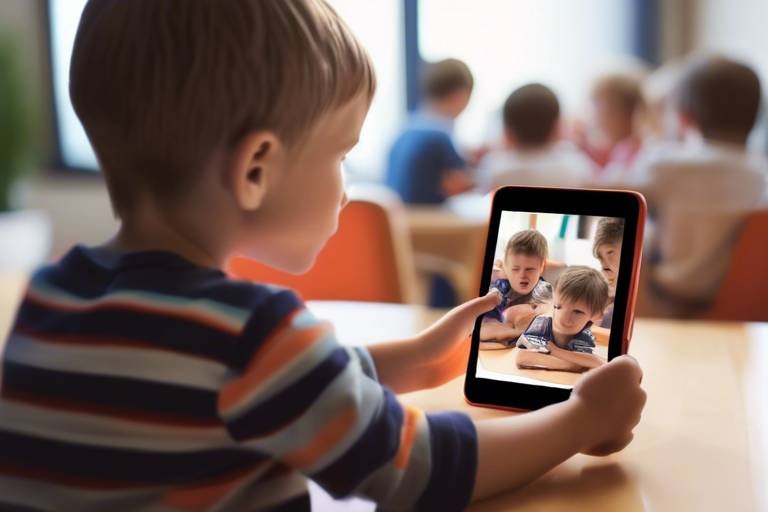Screen Time and Its Effect on Social Skills
In today's fast-paced digital world, the way we interact with each other has transformed dramatically. With the advent of smartphones, tablets, and computers, screen time has become a significant part of our daily lives. This article explores how screen time impacts social skills development, particularly in children and adolescents, and discusses potential strategies for promoting healthy digital habits. As we dive into this topic, it’s essential to consider both the benefits and drawbacks of screen time. After all, can a device that connects us also create barriers?
Have you noticed how much time you or your kids spend glued to screens? According to recent statistics, the average American spends over 7 hours a day on screens, and this number is only increasing. With the rise of social media, streaming services, and online gaming, technology is now woven into the fabric of our lives. Children, in particular, are growing up in a world dominated by screens. In fact, a 2021 report showed that children aged 8 to 18 spend an average of 7.5 hours a day on screens, not including schoolwork. This growing trend raises questions about how these interactions affect their social skills.
So, what exactly are social skills? Simply put, social skills are the abilities that facilitate interaction and communication with others. They include a range of competencies such as listening, empathy, and effective verbal and non-verbal communication. Think of social skills as the glue that holds our relationships together. Without them, conversations can feel awkward, and misunderstandings can arise. These abilities are crucial for building connections, fostering friendships, and navigating the complexities of interpersonal relationships. But how does excessive screen time impact these essential skills?
While screen time often gets a bad rap, it's not all doom and gloom. In fact, there are some positive effects worth mentioning. Online platforms can serve as a bridge for social connections, particularly for those who may struggle with face-to-face interactions. Virtual communities allow individuals to connect over shared interests, fostering friendships that might not have been possible otherwise. For instance, gaming platforms can create a sense of camaraderie among players, leading to lasting friendships. However, it’s essential to strike a balance—too much screen time can lead to isolation.
On the flip side, excessive screen time can significantly hinder face-to-face communication. Picture this: a group of friends hanging out, but instead of engaging with each other, they’re all absorbed in their phones. This scenario is increasingly common and raises concerns about the ability to develop essential social skills. Studies have shown that children who spend more time on screens may struggle with reading social cues, maintaining eye contact, and engaging in meaningful conversations. These skills are crucial for building healthy relationships and navigating social situations.
It’s important to note that different age groups experience varying effects of screen time on social skills. For children, excessive screen use can stunt the development of critical communication skills. Teenagers, on the other hand, may find themselves caught in a paradox: while they’re more connected online, they may feel increasingly isolated in real life. Adults, too, are not immune to the impacts of screen time, often finding it challenging to disconnect from work-related tasks. Understanding these age-related differences is key to addressing the issue effectively.
As parents, navigating the digital landscape can feel overwhelming. However, you play a crucial role in managing your child’s screen time. Setting clear boundaries and encouraging breaks from screens can help foster healthier habits. For example, consider implementing screen-free zones during family meals or designating specific times for device use. Open conversations about online interactions can also help children understand the importance of balancing their virtual and real-life connections.
So, how can we cultivate healthy digital habits that support social skill development? Here are a few strategies:
- Promote Outdoor Activities: Encourage your children to engage in outdoor play or sports, which can enhance their social skills in real-life settings.
- Limit Screen Time: Set daily limits on recreational screen time to ensure a balanced lifestyle.
- Model Positive Behavior: Be a role model by demonstrating healthy screen habits yourself.
By incorporating these practices, we can help our children navigate the digital world without sacrificing their social skills.
Looking ahead, the long-term effects of screen time on social skills remain to be seen. As technology continues to evolve, so will our interactions with it. It's crucial to adapt our approaches to ensure that we foster meaningful connections, both online and offline. By recognizing the potential pitfalls and benefits of screen time, we can work towards a future where technology enhances, rather than hinders, our social skills.
- How much screen time is too much for children? Experts recommend limiting recreational screen time to no more than 1-2 hours per day for children aged 2 and older.
- Can screen time improve social skills? Yes, when used appropriately, online interactions can foster connections and friendships, especially for those who may struggle in face-to-face settings.
- What are some signs that screen time is affecting my child's social skills? Look for signs such as difficulty making eye contact, reluctance to engage in conversations, or a preference for virtual interactions over real-life ones.

The Rise of Screen Time
In today's fast-paced world, the prevalence of screen time has skyrocketed, becoming an undeniable part of our daily lives. From the moment we wake up to the time we go to bed, screens are constantly vying for our attention. Whether it's scrolling through social media, binge-watching our favorite shows, or engaging in video calls, the statistics are staggering. Recent studies indicate that children aged 8 to 12 spend an average of 4 to 6 hours a day on screens, while teenagers can rack up an impressive 7 to 9 hours daily. This doesn't even account for the additional time spent on screens for educational purposes!
But why has screen time surged to such heights? Let's take a look at some factors contributing to this digital explosion:
- Accessibility: With smartphones, tablets, and laptops becoming more affordable and ubiquitous, technology is at our fingertips like never before.
- Entertainment: The rise of streaming services and gaming platforms offers endless entertainment options, making it easy to lose track of time.
- Social Connection: In a world that feels increasingly disconnected, screens provide a way to stay in touch with friends and family, even from afar.
Moreover, the COVID-19 pandemic accelerated this trend, as lockdowns and social distancing measures pushed us to rely on digital platforms for work, education, and social interaction. According to a report by the American Academy of Pediatrics, screen time among children increased by over 50% during the pandemic! This shift has led to a new normal where screens are not just tools for entertainment, but essential lifelines for communication and learning.
As we navigate this digital landscape, it's crucial to understand the implications of increased screen time. Are we sacrificing our social skills for the convenience of virtual interactions? What does this mean for future generations? These questions are vital as we delve deeper into the effects of screen time on our social abilities.
To visualize the rising trend, here's a table that breaks down average daily screen time by age group:
| Age Group | Average Daily Screen Time |
|---|---|
| Children (8-12 years) | 4-6 hours |
| Teenagers (13-18 years) | 7-9 hours |
| Adults (19-64 years) | 6-8 hours |
| Seniors (65+ years) | 2-4 hours |
In conclusion, the rise of screen time is a multifaceted issue that reflects our changing lifestyles and societal norms. While technology offers incredible benefits, it also presents challenges, particularly regarding social skills development. As we continue to embrace the digital age, it's essential to strike a balance between virtual interactions and face-to-face communication, ensuring that our social skills don't suffer in the process.

Understanding Social Skills
Social skills are the building blocks of our interactions with others. They encompass a wide range of abilities that allow us to communicate effectively, express our emotions, and build relationships. Imagine social skills as the glue that holds our connections together, enabling us to navigate the complexities of human interaction. Without these skills, we might find ourselves feeling isolated or misunderstood.
At their core, social skills include verbal and non-verbal communication, active listening, empathy, and the ability to read social cues. These components are crucial for effective interpersonal relationships. For instance, when you engage in a conversation, it's not just about the words you say; it's also about your body language, facial expressions, and tone of voice. These elements can significantly impact how your message is received.
Furthermore, social skills contribute to emotional intelligence, which is our ability to recognize and manage our own emotions while also understanding the emotions of others. This skill is particularly important in building empathy, allowing us to connect with others on a deeper level. When we can empathize, we can respond to others' feelings more appropriately, fostering stronger relationships.
To illustrate the importance of social skills, consider this: a person with exceptional social skills can easily navigate a crowded room, making new acquaintances and engaging in meaningful conversations. In contrast, someone lacking these skills may feel overwhelmed and struggle to connect, resulting in missed opportunities for friendship and collaboration.
In today’s digital age, where face-to-face interactions are often replaced by screens, the development of social skills can be challenged. Children and adolescents, in particular, are at a critical stage where these skills are forming. It's essential to recognize that while technology can facilitate connections, it may also hinder the development of these vital skills if not balanced properly.
In summary, social skills are not just a set of tools for communication; they are essential for fostering healthy relationships and navigating the social landscape of our lives. As we delve deeper into the effects of screen time on these skills, it becomes increasingly important to understand their significance and the potential consequences of neglecting them.

Positive Effects of Screen Time
When we think about screen time, it's easy to jump to the negatives, right? But hold on a second! It’s not all doom and gloom. In fact, there are some positive effects of screen time that often get overlooked. For many, especially the younger generation, screens are not just a source of entertainment; they are gateways to social connections. Think about it: how many friendships have blossomed through a simple text or a video call? The digital landscape offers a unique platform for individuals to connect, share experiences, and build relationships, regardless of distance.
One of the most significant benefits of screen time is the ability to maintain relationships across geographical barriers. Imagine a child who has moved to a new city. Without social media or video chatting, staying in touch with old friends would be a daunting task. But with a few taps on a screen, they can share moments, from a birthday celebration to a casual chat over lunch. This constant connectivity fosters a sense of belonging and community, which is essential for emotional well-being.
Moreover, online platforms can serve as a safe space for those who may struggle with traditional social interactions. For instance, shy or introverted individuals might find it easier to express themselves through text or video rather than face-to-face. This can lead to increased confidence in social situations over time. Additionally, many online communities are built around shared interests, allowing users to find like-minded individuals and form connections that might not be possible in their immediate physical surroundings.
Let's not forget the educational aspect of screen time. Many online resources, from interactive games to educational videos, can enhance social skills. For example, multiplayer games often require teamwork and communication, teaching players how to collaborate and strategize with others. In this way, screen time can act as a training ground for developing essential social skills.
It’s also worth noting that screen interactions can be a springboard for real-world connections. Engaging with peers online can lead to in-person meet-ups, creating a blend of virtual and physical social experiences. Think of it as planting seeds in a garden; the online interactions nurture the relationships until they’re ready to bloom in real life.
In summary, while excessive screen time can have its downsides, it’s essential to recognize the positive effects as well. From maintaining long-distance friendships to fostering confidence in social interactions, screens can play a crucial role in our social lives. As we navigate this digital age, let’s embrace the opportunities that screen time provides for connection and community.

Negative Effects on Face-to-Face Interaction
In a world where our screens are constantly beckoning, the art of face-to-face interaction seems to be slipping through our fingers like sand. Have you ever noticed how a group of friends can be sitting together, yet everyone is glued to their phones? This phenomenon is not just a casual observation; it reflects a deeper issue that is affecting our social skills. The reality is that excessive screen time can lead to significant challenges in developing and maintaining meaningful interpersonal relationships.
One of the most alarming effects of screen time is the decline in our ability to read non-verbal cues. When we communicate through screens, we miss out on the rich tapestry of body language, facial expressions, and tone of voice that are essential for understanding the full context of a conversation. For instance, a simple text message can be misinterpreted without the accompanying visual or auditory signals that we rely on in person. This lack of nuanced communication can lead to misunderstandings, which can strain relationships over time.
Furthermore, the more time we spend interacting with our devices, the less time we invest in developing empathy. Empathy is the ability to understand and share the feelings of others, and it is cultivated through real-life interactions. When children and adolescents prefer screens over face-to-face conversations, they miss out on vital opportunities to practice empathy, leading to a generation that may struggle to connect with others on a deeper emotional level.
Moreover, the comfort of digital communication can create a sense of anxiety when faced with in-person interactions. Imagine a teenager who has spent countless hours chatting online; when it comes time to engage in a real-life conversation, they might feel overwhelmed. This social anxiety can be paralyzing, making them hesitant to engage, express themselves, or even make eye contact. As a result, their social skills may stagnate, causing them to miss out on forming valuable connections.
It's also worth noting that the quality of our relationships can suffer due to excessive screen time. While virtual interactions can keep us connected, they often lack the depth found in face-to-face communication. A study conducted by the Pew Research Center found that individuals who spend more time on social media report feeling lonelier than those who engage in more in-person interactions. This paradox reveals that while technology can connect us, it might also create a false sense of connection that leaves us feeling isolated.
In summary, the negative effects of screen time on face-to-face interaction are profound and multifaceted. As we navigate this digital landscape, it's crucial to recognize the importance of real-life connections. By being mindful of our screen time and prioritizing in-person interactions, we can work towards fostering a generation that values meaningful relationships over fleeting digital ones. After all, the warmth of a smile or the comfort of a hug cannot be replicated through a screen.
- How does screen time affect children's social skills?
Excessive screen time can hinder children's ability to develop empathy, read body language, and engage in meaningful conversations, which are essential for social skills. - Can online interactions be beneficial for social skills?
Yes, online interactions can help maintain relationships and provide social opportunities, but they should not replace face-to-face interactions. - What are some signs of social anxiety related to screen time?
Signs may include avoidance of social situations, difficulty making eye contact, and feeling overwhelmed in face-to-face conversations. - How can parents help their children balance screen time?
Parents can set limits on screen time, encourage outdoor activities, and model healthy communication habits to promote face-to-face interactions.

Age-Related Impacts
The impact of screen time on social skills varies significantly across different age groups. Understanding these differences is crucial for parents, educators, and even the individuals themselves as they navigate their digital landscapes. For instance, young children, who are just beginning to develop their social skills, may face unique challenges when exposed to excessive screen time. Their ability to interpret facial expressions and body language can be hindered, as they miss out on vital non-verbal cues that are typically learned through in-person interactions.
As children transition into their teenage years, the dynamics shift again. Adolescents are often at the forefront of digital communication, using social media platforms to connect with peers. While this can enhance their social networks, it can also lead to a paradox where online interactions replace face-to-face ones. This age group may become adept at texting and sharing memes, yet struggle with the nuances of real-life conversations. It's almost like being a master chef in a virtual kitchen but fumbling when it comes to cooking at the family dinner table!
Moreover, adults experience their own set of challenges. Many find themselves juggling professional responsibilities and personal lives, often turning to screens for both work and leisure. As a result, they might miss opportunities to engage in meaningful conversations with family or friends. This can lead to a decline in emotional intelligence, as adults might become less attuned to the feelings of those around them. It's essential to recognize that while technology can facilitate communication, it can also create barriers if not managed wisely.
To illustrate these age-related impacts, consider the following table that summarizes the effects of screen time across different age groups:
| Age Group | Potential Impacts of Screen Time |
|---|---|
| Children (0-12 years) |
|
| Teenagers (13-19 years) |
|
| Adults (20+ years) |
|
In conclusion, the effects of screen time are not one-size-fits-all; they vary with age and developmental stage. Recognizing these differences allows for better strategies to mitigate negative impacts while enhancing positive interactions. As we move forward in a digital age, it’s essential to find a balance that fosters healthy social skills across all age groups.
Q: How does screen time affect young children's social skills?
A: Excessive screen time can hinder young children's ability to interpret non-verbal cues and engage in face-to-face interactions, which are crucial for developing social skills.
Q: Are teenagers more affected by social media than younger children?
A: Yes, teenagers often rely heavily on digital communication, which can enhance their social networks but may also lead to difficulties in face-to-face interactions and increased social anxiety.
Q: What strategies can adults use to manage screen time effectively?
A: Adults can set boundaries for their screen use, prioritize in-person interactions, and engage in activities that promote emotional connections with others.

Parental Guidance and Screen Time
As parents, navigating the digital landscape can feel like trying to find your way through a maze without a map. With screens becoming an omnipresent part of our children's lives, it's crucial to establish a framework for healthy screen time usage. The question many parents grapple with is: how do we balance the benefits of technology with the need for social skills development? The answer lies in active engagement and guidance.
First and foremost, it's essential to set clear boundaries around screen time. Research suggests that children aged 2 to 5 should have no more than one hour of high-quality programming per day. For older kids, the guidelines are less clear, but the American Academy of Pediatrics recommends that parents establish consistent limits. This can help ensure that screen time does not interfere with sleep, physical activity, and other healthy behaviors.
Moreover, parents should strive to be involved in their children's digital experiences. Instead of allowing your child to explore the online world in isolation, consider watching shows or playing games together. This not only fosters a sense of connection but also provides opportunities for discussions about what they are viewing or experiencing. Ask them questions like, "What did you learn from that game?" or "How do you think that character felt?" This transforms screen time into a shared experience that can enhance communication and critical thinking skills.
It's also vital to encourage offline activities that promote face-to-face interactions. For instance, you might organize family game nights, outdoor activities, or arts and crafts sessions. These moments allow children to practice their social skills in real-life scenarios, reinforcing what they might learn online. A balanced approach helps children understand the value of both digital and physical interactions, teaching them to navigate both worlds effectively.
Creating a family media plan can also be beneficial. This plan should outline specific guidelines for screen use, including when and where devices can be used. For example, you might decide that screens are not allowed during meal times or before bedtime. This can help cultivate a family environment that prioritizes conversation and connection, reducing the likelihood of screens becoming a barrier to meaningful interactions.
Lastly, don’t forget to model healthy screen habits yourself. Children often emulate their parents' behaviors. If they see you engaging in excessive screen time, they may feel it’s acceptable for them as well. By demonstrating a balanced approach, you can instill similar values in your children.
In summary, parental guidance is crucial in navigating the complexities of screen time. By setting boundaries, being involved, encouraging offline activities, creating a family media plan, and modeling healthy behavior, parents can help their children develop essential social skills while still enjoying the benefits of technology.
- How can I monitor my child's screen time effectively? Use apps or built-in features on devices to track usage. Regularly check in with your child about their online activities.
- What are some signs my child may be spending too much time on screens? Look for changes in behavior, such as irritability when not using screens, difficulty sleeping, or a decline in academic performance.
- How can I encourage my child to engage in more offline activities? Offer a variety of options like sports, arts and crafts, or reading. Make these activities fun and engaging to spark their interest.

Encouraging Healthy Digital Habits
In today's fast-paced world, where screens are practically glued to our hands, encouraging healthy digital habits is more crucial than ever. It’s like teaching a child to swim in a pool filled with distractions; you want them to enjoy the water without getting overwhelmed. So, how do we create a balance that promotes social skills while allowing for the benefits of technology? Here are some strategies that can help.
First and foremost, setting clear screen time limits is essential. Think of it as establishing boundaries in a relationship. Just as too much closeness can sometimes lead to discomfort, excessive screen time can hinder real-world connections. According to recent studies, children and adolescents should ideally have no more than 2 hours of recreational screen time each day. This includes everything from gaming to social media scrolling. By limiting screen time, we encourage kids to step outside and engage in activities that foster face-to-face interactions.
Another vital aspect is to model healthy behaviors. Children often mimic their parents' actions. If they see you constantly on your phone during dinner, they might think it’s acceptable to do the same. Instead, make it a family rule to keep screens away during meals or family time. This encourages everyone to engage in meaningful conversations and strengthens family bonds. It’s like planting seeds; the more you nurture them, the more they grow into something beautiful.
Moreover, it’s important to promote interactive screen time. Not all screen time is created equal! Encourage activities that require collaboration and communication, such as online games that involve teamwork or video calls with relatives. This way, children learn to interact with others, even if it’s through a screen. In fact, some studies suggest that virtual interactions can enhance social skills when done mindfully, as they can provide a safe space for practicing communication without the pressure of in-person encounters.
Additionally, consider incorporating offline activities that align with your children's interests. If they love gaming, why not encourage them to join a local gaming club or participate in community events? This not only reduces screen time but also allows them to meet like-minded peers, fostering friendships in a more traditional setting. It’s like finding a balance between enjoying a good book and engaging in lively discussions about it with friends.
Lastly, discussing the content they engage with online is crucial. Open dialogues about social media, video games, and online interactions can help children navigate the digital landscape more effectively. Ask them questions like, “What did you learn from that video?” or “How did that game make you feel?” These conversations can lead to deeper insights and help them develop critical thinking skills about their digital consumption.
In summary, encouraging healthy digital habits is about creating a nurturing environment where technology serves as a tool for growth rather than a barrier to social interaction. By setting limits, modeling behavior, promoting interactive experiences, and engaging in meaningful discussions, we can help children thrive both online and offline. Remember, it’s not about eliminating screens altogether; it’s about teaching our kids how to use them wisely. After all, in a world dominated by technology, the ultimate goal is to ensure that our children can connect with others in a genuine and meaningful way.
- What is the recommended screen time for children? Experts suggest limiting recreational screen time to no more than 2 hours per day for children and adolescents.
- How can I encourage my child to engage in offline activities? Find activities that align with their interests, such as sports, arts, or community clubs, and encourage participation.
- What are some signs of excessive screen time? Look for signs such as irritability when not using screens, withdrawal from family interactions, or a decline in academic performance.
- How can I model healthy screen habits? Keep screens away during family meals, engage in offline hobbies, and set aside time for family activities without devices.

Future Implications
As we look to the horizon, the implications of screen time on social skills are not just a fleeting concern; they represent a significant aspect of our evolving social landscape. With technology rapidly advancing, the way we interact and communicate is undergoing a transformation that could redefine our social fabric. Imagine a world where social interactions are primarily digital—sounds futuristic, right? Yet, it's already happening. The question we must ask ourselves is: how will this shift impact our ability to connect with others on a personal level?
Research indicates that the long-term effects of excessive screen time may lead to a generation that struggles with in-person communication. While many of us may find comfort in the digital realm, the nuances of face-to-face interactions—like reading body language and understanding vocal tones—could become less intuitive. This potential decline in traditional social skills raises concerns about emotional intelligence and empathy in future generations. If we rely too heavily on screens for connection, could we be sacrificing the richness of human interaction?
Consider the following implications:
- Increased Dependency on Digital Communication: As more people become accustomed to communicating through screens, we may see a decline in the ability to engage in spontaneous conversations, which are often crucial for building relationships.
- Shifts in Emotional Intelligence: With less face-to-face interaction, the development of empathy and emotional understanding may suffer, leading to a generation that finds it challenging to relate to others' feelings.
- Changes in Social Norms: As digital interactions become the norm, social etiquette may evolve, potentially leading to misunderstandings in real-world interactions.
Furthermore, the implications extend to various age groups. For children, the formative years spent glued to screens might hinder their ability to develop critical social skills, which could have lasting effects as they transition into adulthood. Teenagers, often at the forefront of technological adoption, may find themselves in a paradox where they are more connected than ever yet feel increasingly isolated. Adults, too, face challenges in balancing their digital lives with genuine social interactions, leading to a potential decline in community engagement.
Looking ahead, it is essential to consider how we can mitigate these effects. Integrating technology in a balanced way could help foster social skills rather than inhibit them. This might involve setting boundaries around screen time, encouraging more face-to-face interactions, and promoting activities that require collaboration and communication. For instance, family game nights or community events can provide opportunities to practice social skills in a supportive environment.
In conclusion, the future of our social skills in the age of screens is a complex and evolving subject. As we navigate this digital landscape, it is crucial to remain aware of the potential consequences on our ability to connect with others. By being proactive and intentional about our screen time habits, we can foster a future where technology enhances rather than detracts from our social skills.
- What are the main effects of excessive screen time on social skills? Excessive screen time can lead to difficulties in face-to-face communication, reduced empathy, and challenges in understanding social cues.
- How can parents help their children develop social skills in a digital world? Parents can set limits on screen time, encourage outdoor play, and facilitate family activities that promote in-person interactions.
- Are there any benefits to screen time related to social skills? Yes, certain online platforms can foster connections and help individuals build relationships, especially for those who may struggle with in-person interactions.
Frequently Asked Questions
- How does screen time affect children's social skills?
Screen time can significantly impact children's social skills by reducing face-to-face interactions. While it offers opportunities for virtual connections, excessive use may hinder the development of essential communication skills, empathy, and emotional intelligence that are best cultivated through in-person experiences.
- Are there any positive effects of screen time on social skills?
Yes, screen time can have positive effects! Online platforms can foster social connections, allowing individuals to maintain relationships across distances. For some, these digital interactions can enhance their ability to communicate and relate to others, particularly when face-to-face opportunities are limited.
- What age group is most affected by screen time?
Different age groups experience varying effects of screen time. Children may struggle with basic social interactions, while teenagers often navigate complex social dynamics online. Adults, on the other hand, may find that excessive screen time impacts their work relationships and personal connections.
- How can parents manage their children's screen time effectively?
Parents can manage screen time by setting clear boundaries and encouraging a balance between digital and real-world interactions. Engaging in family activities that do not involve screens, monitoring usage, and discussing the importance of social skills can help foster healthier habits.
- What are some strategies for encouraging healthy digital habits?
To promote healthy digital habits, consider implementing screen-free zones at home, scheduling regular tech-free family time, and encouraging outdoor activities. Additionally, teaching children about the importance of face-to-face communication can help them develop stronger social skills.
- What long-term effects might excessive screen time have on social skills?
Excessive screen time may lead to long-term challenges in interpersonal relationships, including difficulties in understanding social cues and building emotional connections. As technology continues to evolve, adapting to these changes while maintaining strong social skills will be crucial for future generations.



















